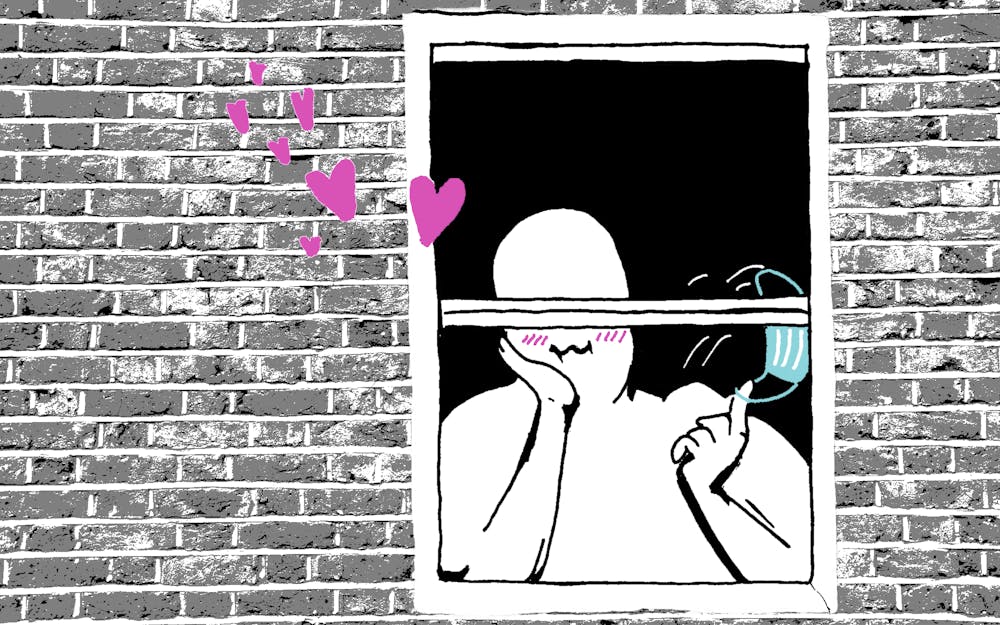Navigating the world of dating and hookup culture is no easy feat, especially when trying to navigate a deadly pandemic. According to a survey conducted by the Pew Research Center, 47% of U.S. adults think dating is harder now than it was ten years ago. Survey respondents feel this is due to increased physical risks of dating, as well as the risk of being lied to or scammed through online platforms.
Add being in your 20s and a global pandemic into the mix, and you have to learn to navigate terrain you never imagined for yourself, especially at such a young age.
In January of 2020, sophomore Ethan Baer was in a stable relationship and living in Pittsburgh, Pennsylvania, while attending Drexel University. Fast forward to January 2021, Baer is single and living in his hometown of Bloomington, after transferring to IU in fall of 2020.
“I definitely transferred because of the pandemic,” Baer said. “I realized being close to family was important to me, and in case anything like this happened again, knock on wood, I would be near people who could help me.”
Not only did the pandemic compel Baer to transfer schools, he said it also played a large role in ending his relationship.
“She was living in Boston and I was in Pittsburgh, so we had already been doing long distance,” Baer said. “But when the pandemic hit in March, I shut down emotionally. I moved home, I didn’t talk to my partner, or to anyone, and that dragged on until she had enough.”
Hannah Witton, a YouTuber and writer who creates content about sexuality and relationships, conducted a survey asking her followers how the pandemic has changed their sex and dating lives. 13% of respondents said they have had both a relationship start and end during the pandemic, and 38% said they were separated from their partners at some point.
Emma Cedar, a 28-year-old Bloomington native, experienced both.
Cedar and her ex had been dating for six months when the pandemic started. The two met while Cedar was studying abroad in her ex’s hometown of London, England. They had just seen each other when the U.S. limited foreign travel in March.
“Even though we had been doing it for a while, being in a long-distance relationship is hard,” Cedar said. “But what was worse about this was not having any control over when we would see each other next. Especially because he was a frontline worker as an anesthesiologist and I couldn’t be there to physically support him.”
After two months of trying to spend time together virtually and four canceled flights to England, Cedar finally was able to end things with her ex in person, with a N95 mask on the whole time.
But even recovering from heartbreak is just as difficult as maintaining a relationship in pandemic times, Cedar says.
“After a breakup, you’re devastated,” Cedar said. “All you want to do is go out with your friends and do fun things to keep your mind off of it, but you can’t even do that.”
While the pandemic has been full of heartbreak, uncertainty and difficulty, both Baer and Cedar have learned valuable things about themselves from experiencing their breakups.
“Now more than ever I have realized how important communication is, especially when it is someone you care about and times get tough,” Baer said.
For Cedar, all the time she spent alone during the pandemic allowed her to discover things about the sexual relationship she has with her body, and how that translates to relationships she has with sexual partners.
“During masturbation I removed the sexual relationship with other people, but what has stayed in my relationship with myself,” Cedar said. “I’m now not as desperate to have somebody in my life for the reason of sex, because I know I’ll be satisfied either way.”
According to the U.S. National Library of Medicine, humans are social creatures. We need social interaction, as it is one of our most basic instincts. Being distanced from others for months on end does not bode well for our mental and emotional wellbeing.
Cedar has seen this and has a message for people choosing to date during the pandemic and after when people are at their most vulnerable: be kind.
“I’ve noticed that when dating people during this time we talk so much about fulfilling a need for ourselves, but many people aren’t getting the support or emotion they need,” Cedar said. “We need each other and they’re not getting that right now. A little compassion goes a long way.”
Taylor Harmon (she/her) is a sophomore studying Sexuality, Gender, and Reproductive Health and Theatre.




